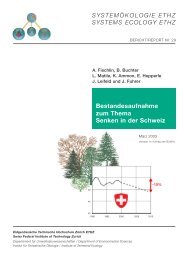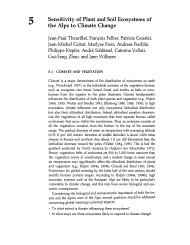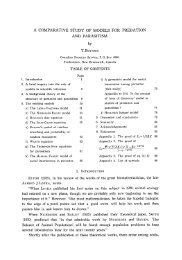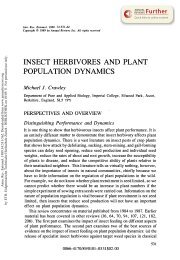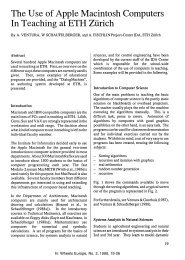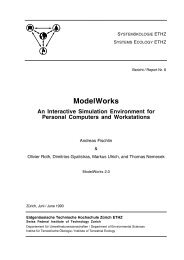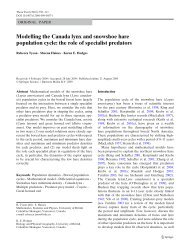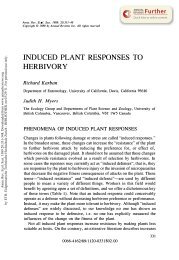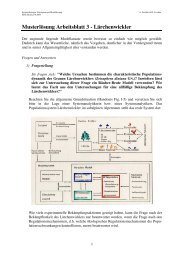On the Ecology of Mountainous Forests in a Changing Climate: A ...
On the Ecology of Mountainous Forests in a Changing Climate: A ...
On the Ecology of Mountainous Forests in a Changing Climate: A ...
Create successful ePaper yourself
Turn your PDF publications into a flip-book with our unique Google optimized e-Paper software.
160 Chapter 6<br />
practice. Third, <strong>the</strong> regionalized scenarios <strong>of</strong> climatic change (Gyalistras et al. 1994) for<br />
<strong>the</strong> sites Bever, Davos, and Bern were taken from Bugmann & Fischl<strong>in</strong> (1994).<br />
Uncerta<strong>in</strong>ty <strong>in</strong>herent <strong>in</strong> climate scenarios<br />
Some <strong>of</strong> <strong>the</strong> uncerta<strong>in</strong>ty <strong>in</strong>herent <strong>in</strong> <strong>the</strong> regionalized scenarios <strong>of</strong> climatic change can be<br />
quantified explicitly (Gyalistras et al. 1994), whereas this would be more difficult for <strong>the</strong><br />
IPCC scenario (Fischl<strong>in</strong> et al. 1994); for <strong>the</strong> Kienast scenario, it is hardly feasible. Thus,<br />
<strong>the</strong> regionalized scenarios <strong>of</strong> climatic change at <strong>the</strong> sites Bever, Davos, and Bern were<br />
selected to study <strong>the</strong> uncerta<strong>in</strong>ty <strong>in</strong>herent <strong>in</strong> a given climate scenario (Tab. 6.3).<br />
Tab. 6.3: Uncerta<strong>in</strong>ty <strong>in</strong>herent <strong>in</strong> <strong>the</strong> regionalized scenarios <strong>of</strong> climatic change (Tab. 6.2), expressed as<br />
twice <strong>the</strong> standard deviation (2·σ) <strong>of</strong> <strong>the</strong> downscal<strong>in</strong>g models (Gyalistras et al. 1994); <strong>the</strong>se uncerta<strong>in</strong>ties<br />
were also used <strong>in</strong> <strong>the</strong> gap model study by Bugmann & Fischl<strong>in</strong> (1994).<br />
Site T Summer P Summer T W<strong>in</strong>ter P W<strong>in</strong>ter<br />
Bern ±1.21 °C ±3.96 cm/mo ±1.33 °C ±1.72 cm/mo<br />
Davos ±0.74 °C ±1.95 cm/mo ±1.26 °C ±3.18 cm/mo<br />
Bever ±1.59 °C ±2.39 cm/mo ±0.94 °C ±1.20 cm/mo<br />
Transient climatic changes<br />
It is a common practice <strong>in</strong> systems <strong>the</strong>ory to explore <strong>the</strong> response <strong>of</strong> a system to a step<br />
change <strong>in</strong> <strong>the</strong> <strong>in</strong>put data (Fig. 6.4). <strong>On</strong> <strong>the</strong> o<strong>the</strong>r hand, most <strong>of</strong> <strong>the</strong> previous impact assessments<br />
us<strong>in</strong>g forest gap models<br />
have adopted a l<strong>in</strong>ear change<br />
<strong>of</strong> climatic parameters over time<br />
(e.g. Solomon 1986, Pastor &<br />
X c<br />
step<br />
Post 1988, Kienast 1991). In<br />
l<strong>in</strong>ear (ramp)<br />
reality, climatic change will<br />
follow nei<strong>the</strong>r <strong>of</strong> <strong>the</strong>se assumptions,<br />
and a more gradual,<br />
X 0<br />
sigmoid<br />
e.g. sigmoid change would be<br />
more likely to occur. Thus, <strong>the</strong>se<br />
t 0 t 0 + 100<br />
Fig. 6.4: Three types <strong>of</strong> transient climatic change that are<br />
three types <strong>of</strong> climatic changes<br />
explored <strong>in</strong> this study. X 0 : Long-term mean value <strong>of</strong> a<br />
were used <strong>in</strong> <strong>the</strong> present study climatic variable (e.g., average <strong>of</strong> July temperature) under<br />
current climatic conditions; X c : Long-term mean value <strong>of</strong> <strong>the</strong><br />
(Fig. 6.4).<br />
variable under <strong>the</strong> climatic change scenario. The time axis is<br />
<strong>in</strong> years; t 0 is <strong>the</strong> time when <strong>the</strong> climate starts to change.



